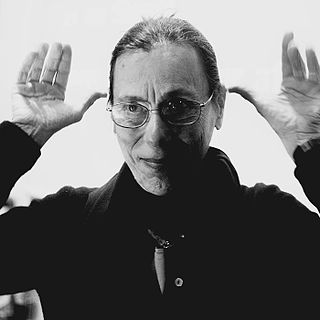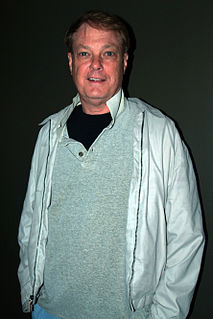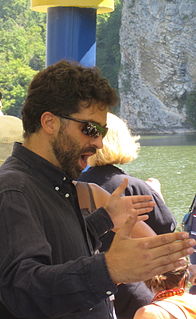Цитата Дункана Джонса
Я занимался промоушеном Moon в Лос-Анджелесе в то же время, когда Тони Скотт был там с [The Take of] Pelham 123. Но, очевидно, он был настолько сосредоточен на своем собственном фильме, что даже не знал, что я снимаюсь в полнометражном фильме. .
Связанные цитаты
Художественный фильм сильно изменился. Арт-хаусы ушли, и теперь люди показывают определенный тип кино в больших кинотеатрах, что, знаете ли, не очень хорошо для меня, и если бы я снял художественный фильм, я думал, что буду играть в Лос-Анджелесе и Нью-Йорке. на неделю, а потом сразу на телевидение.
Я очень уважаю это ремесло, я не знаю, насколько оно уважает меня. Но это точный процесс. Делать это на сцене было бы, я думаю, ужасно. Делать это на пленке есть свои трудности, потому что пленка не способствует спонтанности. Вы можете немного посмеяться в восемь часов утра, но вы не будете смеяться над одним и тем же весь день.
Я должен сказать, что феминизм дал мне разрешение иметь дело со своей собственной эмоциональной жизнью и выдвигать ее на первый план определенным образом или использовать фильм как способ исследовать в то время мой собственный гетеросексуальный опыт. «Жизнь исполнителей» стала началом такого рода расследования. Но также на фильм повлияла эстетика и структура экспериментального фильма, поскольку это происходило в то же время. В то время Холлис Фрэмптон оказал на меня большое влияние.
Люди спрашивают: «Чем съемка фильма отличается от работы над рекламой?» Ну, когда ты делаешь рекламу, тебе не нужно продавать билеты. У вас есть захваченная аудитория. Что на самом деле совершенно редко и здорово; это дает вам много свободы. Когда вы снимаете фильм, вы должны делать для него рекламу.
Очевидно, что в «Луне» есть большая дань уважения Запределью. Я, очевидно, получил ответ Ридли Скотта, который был великолепен. Но Питер Хайамс действительно любил Мун и был в восторге от него. Он также был в восторге от того факта, что мы помнили Запределье и вспоминали его с любовью. Я думаю, для него было своего рода назиданием, что есть люди, которые любят его фильм. Итак, это было действительно прекрасное чувство.
На тот момент я написал три книги [Игры престолов], и каждая из них была лучше другой. В какой-то момент, когда дела с книгами шли хорошо, ко мне начал проявлять интерес Голливуд, различные продюсеры и студии, которые изначально были заинтересованы в создании художественного фильма. Я встречался с некоторыми из этих людей и разговаривал по телефону с некоторыми из них, но я не видел, чтобы это было сделано как художественный фильм.
Удивительный факт, что один человек может сделать свой собственный фильм - я думаю, что анимация в этом отношении уникальна. Мне не нужно иметь дело с юристами. Мне не нужно иметь дело с корпорациями. Мне не нужно иметь дело с руководителями или агентами или кем-то в этом роде. Я могу просто сидеть дома и снимать художественный фильм. Это замечательный опыт. Каждый фильм, который я делаю, становится все более популярным, получает больше прессы и приносит больше денег. Так что удивительно, что я выжил и на самом деле преуспевал, занимаясь домашним, кустарным кинопроизводством.
Когда ты снимаешься в фильме, и большая часть фильма отливает черным, для меня очень важно, чтобы люди смотрели на эти фильмы просто как на фильмы, просто как на хорошие фильмы. В конце концов, независимо от цвета актерского состава, мы все делаем одно и то же в этом бизнесе: пытаемся снять хороший фильм.
Я думаю, что сила короткометражного фильма невероятно недооценена. Гораздо проще заставить кого-то посмотреть 15-минутный фильм, чем полнометражный фильм. В эти 15 минут у вас есть возможность выразить свой голос как артиста и, надеюсь, связаться со своей аудиторией. Если вы пытаетесь стать режиссером-новичком, то короткометражный фильм, демонстрирующий, что вы понимаете темы и концепции фильма, который вы хотите снять, — это не проблема. Независимо от того, являются ли они сотрудниками или потенциальными инвесторами, кинопроизводство — это форма визуального искусства, поэтому вам, очевидно, нужны визуальные эффекты, чтобы показать их!
Я начал снимать документальные фильмы в первую очередь из-за войны. Я всегда хотел сниматься в художественных фильмах, а когда началась война, я учился на режиссера, поэтому раньше работал с актерами, в кино и в театре. Поэтому я думаю, что с актерами легко работать, когда у вас есть четкий сценарий, когда они знают, что и почему они делают.



































